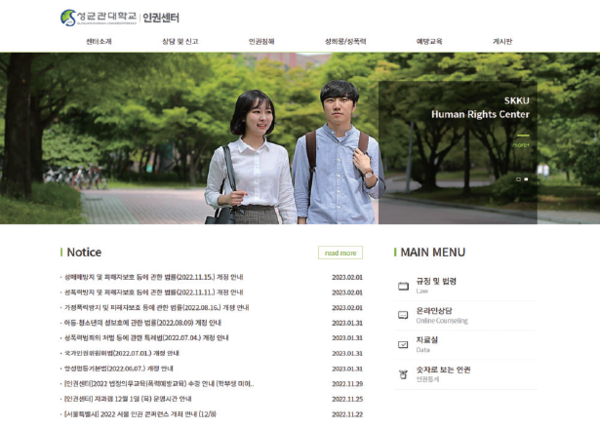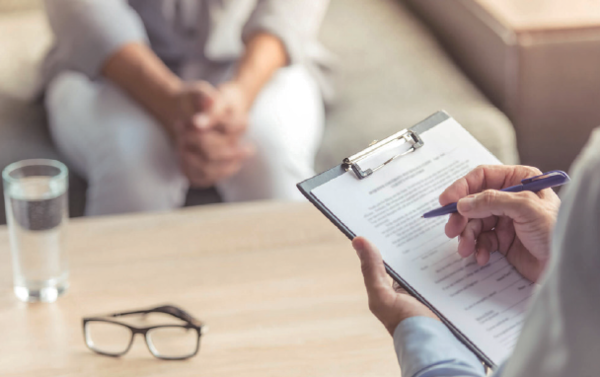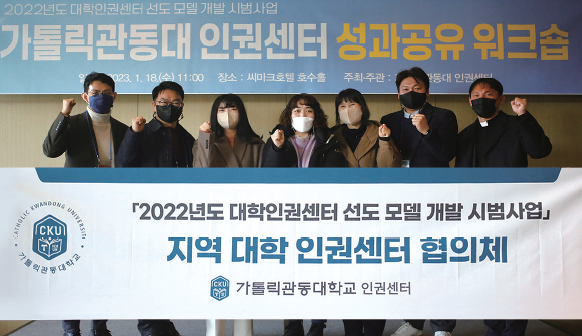For a campus without violence and discrimination, university human rights centers are indispensable. One year ago, the revision of the Higher Education Act mandated the establishment of human rights centers in all universities, and now is the time to assess their effectiveness. Therefore, the Sungkyun Times (SKT) will explore the concept of university human rights centers, inspect the current limits, and suggest solutions for improvement.
Center for Peace and Equality
-What Is a University Human Rights Center?
A university human rights center is an organization that aims to promote human rights and achieve social justice on campus. It operates based on the three main roles of protection, remedy, and promotion. These functions are manifested into more specific duties such as counseling, resolving cases of human rights violations, and promoting educational programs. Since these duties may involve various measures on campus, the cooperation of other school departments is essential. The appearance of these centers in Korea began in 2012 with their establishments at Chung-Ang University and Seoul National University. In the beginning, they mostly focused on sexual violence issues; however, after the human rights violation cases in universities drew national attention in the 2010s, the centers gradually expanded their spectrum to general cases. Following the 2022 revision of the Higher Education Act that requires all higher institutions to build human rights centers, universities are currently administering a center of their own.
-Here at Sungkyunkwan University
Sungkyunkwan University’s (SKKU) Human Rights Center strives to create a human rights-friendly environment on campus. The center is located on both campuses: on the third floor of the Dasan Hall of Economics at the Humanities and Social Sciences Campus (HSSC) and on the third floor of the Shops & Services Center at the Natural Sciences Campus (NSC). The physical offices, as well as their official websites, provide various services for SKKU members. For the protection of rights, the center holds counseling sessions through visits, phone calls, and online sessions. Kingos can easily reserve a counseling session by submitting a reservation form on its official website. If the sessions show signs of severe human rights violations, the center can register the issue as an official case and begin an investigation to find a solution.

Centers under Crisis
-Lack of Power
Despite the various duties centers must carry out, they face many limitations due to their weak authority. First, many centers cannot conduct surveys to apprehend the comprehensive status of human rights on campus and prevent potential violations. According to 2020 research by Korea Human Rights Policy Institute, only 17 out of 62 centers administered surveys regarding the general condition of human rights violations in their universities. Furthermore, centers also suffer from a low reputation amongst other departments since most of their employees are hired as contractors. Consequently, they face hardships in requesting the cooperation of other quarters when needed. Additionally, human rights centers lack the right to investigate coercively, which worsens the issue. Even after investigating and reviewing cases, concerns regarding efficacy still arise as centers have less power in subsequent remedial measures. The authority is limited to moral suasions, and there is no effective tool to enforce them even when the suasions are not executed. Many centers also do not have any specific protocols for dealing with other departments when they do not accept the center’s requests. Moreover, they cannot interfere with the time the departments take to proceed with the final measures of the case. This delays the proceedings of each case, which can lead to secondary victimization.
-Doubts in Competency
Another impending crisis is the lack of budget and shortage of workers, which can harm a center’s ability to provide quality services. First, many centers are under financial pressure because they are operated only with the university’s budget, without governmental support. Though the Higher Education Act states that the government can financially aid university human rights centers, it does not require the government to do so. Eventually, this often causes a shortage of fund for the centers. Such financial difficulties also lead to a scarcity of employees, further dropping the center’s quality of service. Apart from the shortage of general manpower, a 2020 study by the National Human Rights Commission revealed that there are two human rights experts per university, further proving the extreme workforce shortage. Due to such a lack of faculties, one or two employees conduct the duties of counseling, investigating, and reviewing each case. The roles of a counselor and an investigator should be strictly distinguishable, as such a mix of work hampers the proceedings of a case and impairs trust from school members. Additionally, the lack of finance and labor force can result in low-quality human rights education. Many universities’ human rights centers, including the SKKU Human Rights Center, merely redistribute the materials of compulsory legal education produced by the government without any additional review.

To Truly Defend Our Rights
-The Need for Empowerment
First and foremost, the university should strengthen the authority of the Human Rights Center and increase campus surveys so that the centers can accurately understand the status of human rights. This is plausible if the power to conduct regular surveys is granted through the center’s regulations. Next, a cooperative partnership between the Human Rights Center and other departments must be instituted, which will accelerate the time for centers to investigate a case as it gets registered. For this to happen, the university can officially require the cooperation of other departments through the revision of center regulations. For example, the Korea University of Technology and Education indirectly obliged other departments to cooperate by stating that the President must enforce the measures of the center. The centers’ power should also be enlarged in the realms of remedial actions. Primarily, the universities need to prepare a tool for the center to mandate their suasions. For instance, the SKKU Human Rights Center makes other departments obey the center’s remedial measures through its official regulations. Also, a detailed protocol that enables the center to check whether their suasion has been accepted and then allows them to conduct extra enforcement should be established. The University of Seoul, for instance, clarifies that their center can give additional measures when the center’s decision is not carried out.
-Build Competency for Trust
If the university cannot grant sufficient investment to the human rights center and detriment its services, it could lead to skepticism about the center’s existence and further minimize any investment. Therefore, it is ideal for the federal government to financially support universities’ human rights centers. The Ministry of Education must expand the 2022 University Human Rights Centers Pilot Project which granted \50 billion to seven selected universities. Based on such investments, the centers should not only increase the general number of employees but also recruit experts such as legal practitioners to act as multifaceted organizations. With a secure budget and a strong labor force, a system of case proceedings should also be distinctively organized. In particular, the separation of counseling and investigation sectors will increase efficacy and equity, contributing to the reliability of the center. In addition, the center must organize a substantial education curriculum. Instead of distributing the materials provided by the government, developing high-quality educational content should be the ultimate objective. Various competitions and campaigns could be also held for a more valuable education. An SKKU student (Sophomore, English Language & Literature) added, “Distributing additional materials like leaflets and related books would be more helpful than making students passively watch videos and solve quizzes."

University is where people from diverse backgrounds meet to share their knowledge and blossom intellectuality. However, serious issues due to power dynamics can also occur on campus. University human rights centers strive to free our campuses from those threats, but they must overcome some realistic limits. As members of the campus, Kingos should also take interest in the centers, giving both applause and criticism to ensure a better future.
